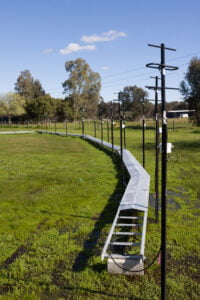About
ERA is the Educational Radio Array radio telescope sited at the SPIRIT Observatory south of Perth.
ERA is a 50 antenna radio telescope array built primarily for education and outreach purposes. The array is a fully functional radio interferometer and supports programs exploring:
- The electromagnetic (EM) spectrum
- the radio properties of the sun
- wave propagation and wave interference
- fundamentals of radio interferometry
- radio astronomy imaging and beamforming

Important Links
School Program Data
You will need to download the following three CSV files.
day1.csv day2.csv – antarray.csv
Jupyter Lab
For high school student projects, we will be doing most of our work in a sandboxed python environment called Jupyter Lab notebook.
Note: This website works best in Chrome, Firefox, or Microsoft Edge. Do not use it in a private window
Learmonth Observatory
We will be checking our data against the Solar Observatory in Learmonth, Western Australia.
The Telescope
 ERA is a radio telescope array with 50 antennas arranged in a perturbed Reuleaux triangle configuration with diameter approximately 35m. The array uses commercial off-the-shelf (COTS) products for many of the components including antennas and receivers. The ERA antennas are optimised for 320-330 MHz, which includes the 325-327 MHz band that has some protections for radio astronomy.
ERA is a radio telescope array with 50 antennas arranged in a perturbed Reuleaux triangle configuration with diameter approximately 35m. The array uses commercial off-the-shelf (COTS) products for many of the components including antennas and receivers. The ERA antennas are optimised for 320-330 MHz, which includes the 325-327 MHz band that has some protections for radio astronomy.
The antennas for ERA are 3-element Yagis fixed pointing at the zenith. The antennas, by design, see a large fraction of the visible sky (similar in concept to SKA-Low antennas), so ERA is sensitive to signals from a large fraction of the sky, and signals from specific radio sources can be isolated by radio astronomy imaging or beamforming.
Technical Information
Student Projects
We welcome students who want to engage with the ERA program for bigger projects!
For tertiary and graduate students contact Randal Wayth below.
For all other students please send an email to education@icrar.org
Contact Information
General and technical inquiries: A/Prof Randall Wayth.
ICRAR Outreach & Education coordinator: Leah Kalimeris.
SPIRIT Observatory Coordinator: Tim Young.